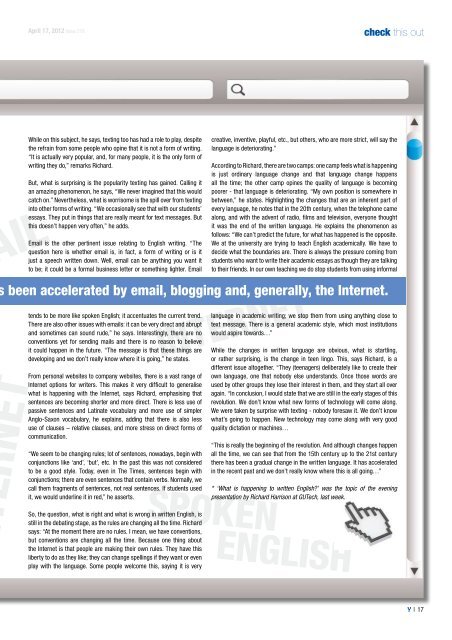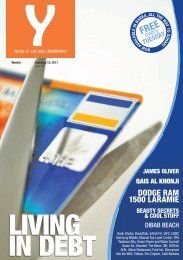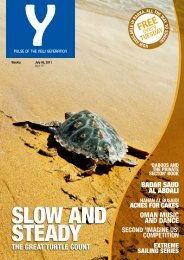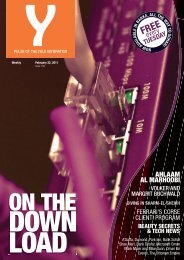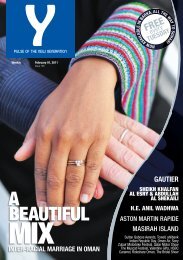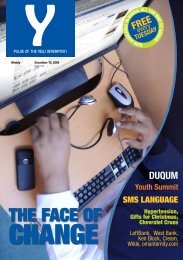Y - Issue 216 - April 17, 2012 - Y-oman.com
Y - Issue 216 - April 17, 2012 - Y-oman.com
Y - Issue 216 - April 17, 2012 - Y-oman.com
You also want an ePaper? Increase the reach of your titles
YUMPU automatically turns print PDFs into web optimized ePapers that Google loves.
<strong>April</strong> <strong>17</strong>, <strong>2012</strong> <strong>Issue</strong> <strong>216</strong><br />
While on this subject, he says, texting too has had a role to play, despite<br />
the refrain from some people who opine that it is not a form of writing.<br />
“It is actually very popular, and, for many people, it is the only form of<br />
writing they do,” remarks Richard.<br />
IL<br />
EMAIL<br />
But, what is surprising is the popularity texting has gained. Calling it<br />
an amazing phenomenon, he says, “We never imagined that this would<br />
catch on.” Nevertheless, what is worrisome is the spill over from texting<br />
into other forms of writing. “We occasionally see that with our students’<br />
essays. They put in things that are really meant for text messages. But<br />
this doesn’t happen very often,” he adds.<br />
Email is the other pertinent issue relating to English writing. “The<br />
question here is whether email is, in fact, a form of writing or is it<br />
just a speech written down. Well, email can be anything you want it<br />
to be; it could be a formal business letter or something lighter. Email<br />
creative, inventive, playful, etc., but others, who are more strict, will say the<br />
language is deteriorating.”<br />
According to Richard, there are two camps: one camp feels what is happening<br />
is just ordinary language change and that language change happens<br />
all the time; the other camp opines the quality of language is be<strong>com</strong>ing<br />
poorer - that language is deteriorating. “My own position is somewhere in<br />
between,” he states. Highlighting the changes that are an inherent part of<br />
every language, he notes that in the 20th century, when the telephone came<br />
along, and with the advent of radio, films and television, everyone thought<br />
it was the end of the written language. He explains the phenomenon as<br />
follows: “We can’t predict the future, for what has happened is the opposite.<br />
We at the university are trying to teach English academically. We have to<br />
decide what the boundaries are. There is always the pressure <strong>com</strong>ing from<br />
students who want to write their academic essays as though they are talking<br />
to their friends. In our own teaching we do stop students from using informal<br />
TERNET<br />
been accelerated by email, blogging and, generally, the Internet.<br />
tends to be more like spoken English; it accentuates the current trend.<br />
There are also other issues with emails: it can be very direct and abrupt<br />
and sometimes can sound rude,” he says. Interestingly, there are no<br />
conventions yet for sending mails and there is no reason to believe<br />
it could happen in the future. “The message is that these things are<br />
developing and we don’t really know where it is going,” he states.<br />
From personal websites to <strong>com</strong>pany websites, there is a vast range of<br />
Internet options for writers. This makes it very difficult to generalise<br />
what is happening with the Internet, says Richard, emphasising that<br />
sentences are be<strong>com</strong>ing shorter and more direct. There is less use of<br />
passive sentences and Latinate vocabulary and more use of simpler<br />
Anglo-Saxon vocabulary, he explains, adding that there is also less<br />
use of clauses – relative clauses, and more stress on direct forms of<br />
<strong>com</strong>munication.<br />
“We seem to be changing rules; lot of sentences, nowadays, begin with<br />
conjunctions like ‘and’, ‘but’, etc. In the past this was not considered<br />
to be a good style. Today, even in The Times, sentences begin with<br />
conjunctions; there are even sentences that contain verbs. Normally, we<br />
call them fragments of sentences, not real sentences. If students used<br />
it, we would underline it in red,” he asserts.<br />
So, the question, what is right and what is wrong in written English, is<br />
still in the debating stage, as the rules are changing all the time. Richard<br />
says: “At the moment there are no rules. I mean, we have conventions,<br />
but conventions are changing all the time. Because one thing about<br />
the Internet is that people are making their own rules. They have this<br />
liberty to do as they like; they can change spellings if they want or even<br />
play with the language. Some people wel<strong>com</strong>e this, saying it is very<br />
language in academic writing; we stop them from using anything close to<br />
text message. There is a general academic style, which most institutions<br />
would aspire towards…”<br />
INTERNET<br />
While the changes in written language are obvious, what is startling,<br />
or rather surprising, is the change in teen lingo. This, says Richard, is a<br />
different issue altogether. “They (teenagers) deliberately like to create their<br />
own language, one that nobody else understands. Once those words are<br />
used by other groups they lose their interest in them, and they start all over<br />
again. “In conclusion, I would state that we are still in the early stages of this<br />
revolution. We don’t know what new forms of technology will <strong>com</strong>e along.<br />
We were taken by surprise with texting - nobody foresaw it. We don’t know<br />
what’s going to happen. New technology may <strong>com</strong>e along with very good<br />
quality dictation or machines…<br />
“This is really the beginning of the revolution. And although changes happen<br />
all the time, we can see that from the 15th century up to the 21st century<br />
there has been a gradual change in the written language. It has accelerated<br />
in the recent past and we don’t really know where this is all going…”<br />
SPOKEN<br />
ENGLISH<br />
* ‘What is happening to written English’ was the topic of the evening<br />
presentation by Richard Harrison at GUTech, last week.<br />
<strong>17</strong>


